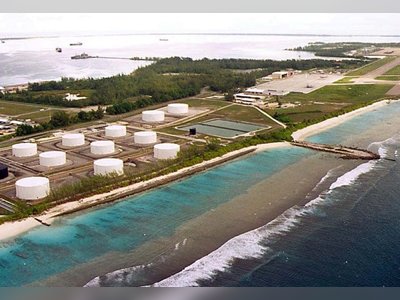Climate change is damaging the lifelong health of children across the world, medical officials warn
Scientists and health experts warn that children will suffer from infectious diseases, malnutrition and air pollution worsened by climate change, in a new report from The Lancet. A child born today will experience a world that is more than 4˚C warmer by the time they turn 71 years old, which will threaten their health at every stage of their life.
Climate change has become a widespread concern as more frequent and extreme weather events triggered by rising temperatures occur across the globe.
In just the past several months, a heat wave scorched Europe, wildfires tore across the Amazon rainforest, parts of California, Russia and the Arctic, and Hurricane Dorian pummeled the Bahamas.
Climate change is already damaging the health of children, and its impacts will harm the entire generation with serious health problems throughout their lives, according to a new report from the medical journal The Lancet.
Scientists and health experts from 35 academic institutions and United Nations agencies said that children will suffer from a rise in infectious diseases, malnutrition and air pollution if global warming continues on the current trajectory.
A child born today will experience a world that is more than 4˚C warmer by the time they turn 71 years old, a rate of warming that will threaten their health at every stage of their life, the report’s authors said.
“Children are particularly vulnerable to the health risks of a changing climate,” said Nick Watts, executive director of The Lancet Countdown, an annual report tracking connections between public health and climate change.
“Their bodies and immune systems are still developing, leaving them more susceptible to disease and environmental pollutants,” he said.
If greenhouse gas emissions continue at the current rate, the atmosphere will warm up by 1.5˚C in about 20 years. Warming starting at 2˚C could trigger an international food crisis in coming years, according to a recent report from the U.N.’s scientific panel on climate change.
“Without immediate action from all countries to cut greenhouse gas emissions, gains in well being and life expectancy will be compromised, and climate change will come to define the health of an entire generation,” Watts said.
Children are more susceptible to infectious diseases exacerbated by rising temperatures and changing rainfall patterns, according to the report. For example, climate change is causing the spread of dengue fever, a mosquito-borne disease. Nine of the 10 most hospitable years for dengue transmission have occurred since 2000.
Furthermore, children will breathe more toxic air throughout their lives, which will lead to reduced lung function, worse asthma and an increased risk of heart attack, the report said. The World Health Organization estimates that around 7 million people die every year from exposure to particles in polluted air.
Premature deaths from outdoor air pollution reached 2.9 million worldwide in 2016. More than 440,000 of those deaths were from coal emissions, according to the report.
“This year, the accelerating impacts of climate change have become clearer than ever,” said Hugh Montgomery, director of the Institute for Human Health and Performance at University College London and a co-chair of the report.
Climate change has become a widespread concern as more frequent and extreme weather events triggered by rising temperatures occur across the globe.
In just the past several months, a heat wave scorched Europe then moved to Greenland to cause record ice melt there; record fires tore across the Amazon rainforest, parts of California, Russia and the Arctic, and Hurricane Dorian pummeled the Bahamas and killed at least 65 people.
Roughly 77% of countries across the world experienced an increase in exposure to wildfires from 2001 to 2014 and from 2015 to 2018, the report said.
“The highest recorded temperatures in Western Europe and wildfires in Siberia, Queensland, and California tri.”
These extreme weather disasters will continue to worsen across the world and result in displacement, illness and death. Lower-income countries will be the most vulnerable, as nearly all economic losses from extreme weather events are uninsured, the report said.
The Lancet report called for quick action to curb climate change and prepare global health systems for the immense challenges ahead.
If global warming is limited to well below 2˚C, which is a goal of the Paris Climate Accord, then a child born today could experience a world that will reach net-zero emissions in about 30 years, the authors said.
Nations have delayed curbing their greenhouse gas emissions for so long that warming of 1.5˚C is inevitable. Global greenhouse emissions would need to be cut in half in just 12 years and reach net-zero by 2050 in order for temperatures to remain at 1.5˚C.
But reaching that goal will be a longshot. According to the report, total primary energy supply from coal between 2016 and 2018 increased by 1.7%. Global fossil fuel consumption subsidies also increased by 50% over the past 3 years, reaching a peak of almost $430 billion last year.
“Our children recognize this climate emergency and demand action to protect them,” Montgomery said. “We must listen, and respond.”
In just the past several months, a heat wave scorched Europe, wildfires tore across the Amazon rainforest, parts of California, Russia and the Arctic, and Hurricane Dorian pummeled the Bahamas.
Climate change is already damaging the health of children, and its impacts will harm the entire generation with serious health problems throughout their lives, according to a new report from the medical journal The Lancet.
Scientists and health experts from 35 academic institutions and United Nations agencies said that children will suffer from a rise in infectious diseases, malnutrition and air pollution if global warming continues on the current trajectory.
A child born today will experience a world that is more than 4˚C warmer by the time they turn 71 years old, a rate of warming that will threaten their health at every stage of their life, the report’s authors said.
“Children are particularly vulnerable to the health risks of a changing climate,” said Nick Watts, executive director of The Lancet Countdown, an annual report tracking connections between public health and climate change.
“Their bodies and immune systems are still developing, leaving them more susceptible to disease and environmental pollutants,” he said.
If greenhouse gas emissions continue at the current rate, the atmosphere will warm up by 1.5˚C in about 20 years. Warming starting at 2˚C could trigger an international food crisis in coming years, according to a recent report from the U.N.’s scientific panel on climate change.
“Without immediate action from all countries to cut greenhouse gas emissions, gains in well being and life expectancy will be compromised, and climate change will come to define the health of an entire generation,” Watts said.
Children are more susceptible to infectious diseases exacerbated by rising temperatures and changing rainfall patterns, according to the report. For example, climate change is causing the spread of dengue fever, a mosquito-borne disease. Nine of the 10 most hospitable years for dengue transmission have occurred since 2000.
Furthermore, children will breathe more toxic air throughout their lives, which will lead to reduced lung function, worse asthma and an increased risk of heart attack, the report said. The World Health Organization estimates that around 7 million people die every year from exposure to particles in polluted air.
Premature deaths from outdoor air pollution reached 2.9 million worldwide in 2016. More than 440,000 of those deaths were from coal emissions, according to the report.
“This year, the accelerating impacts of climate change have become clearer than ever,” said Hugh Montgomery, director of the Institute for Human Health and Performance at University College London and a co-chair of the report.
Climate change has become a widespread concern as more frequent and extreme weather events triggered by rising temperatures occur across the globe.
In just the past several months, a heat wave scorched Europe then moved to Greenland to cause record ice melt there; record fires tore across the Amazon rainforest, parts of California, Russia and the Arctic, and Hurricane Dorian pummeled the Bahamas and killed at least 65 people.
Roughly 77% of countries across the world experienced an increase in exposure to wildfires from 2001 to 2014 and from 2015 to 2018, the report said.
“The highest recorded temperatures in Western Europe and wildfires in Siberia, Queensland, and California tri.”
These extreme weather disasters will continue to worsen across the world and result in displacement, illness and death. Lower-income countries will be the most vulnerable, as nearly all economic losses from extreme weather events are uninsured, the report said.
The Lancet report called for quick action to curb climate change and prepare global health systems for the immense challenges ahead.
If global warming is limited to well below 2˚C, which is a goal of the Paris Climate Accord, then a child born today could experience a world that will reach net-zero emissions in about 30 years, the authors said.
Nations have delayed curbing their greenhouse gas emissions for so long that warming of 1.5˚C is inevitable. Global greenhouse emissions would need to be cut in half in just 12 years and reach net-zero by 2050 in order for temperatures to remain at 1.5˚C.
But reaching that goal will be a longshot. According to the report, total primary energy supply from coal between 2016 and 2018 increased by 1.7%. Global fossil fuel consumption subsidies also increased by 50% over the past 3 years, reaching a peak of almost $430 billion last year.
“Our children recognize this climate emergency and demand action to protect them,” Montgomery said. “We must listen, and respond.”














